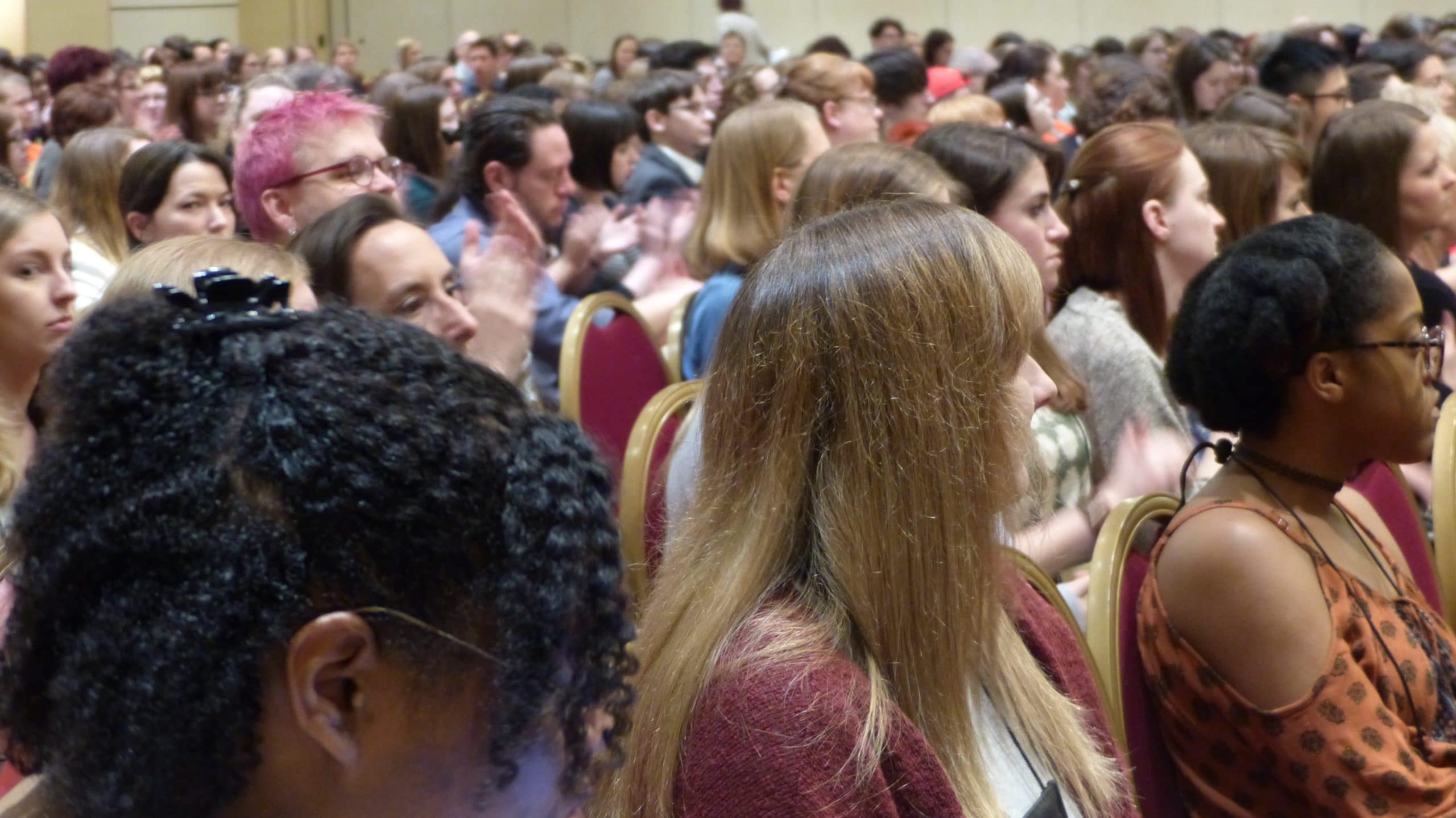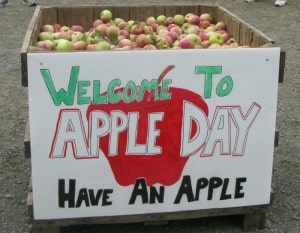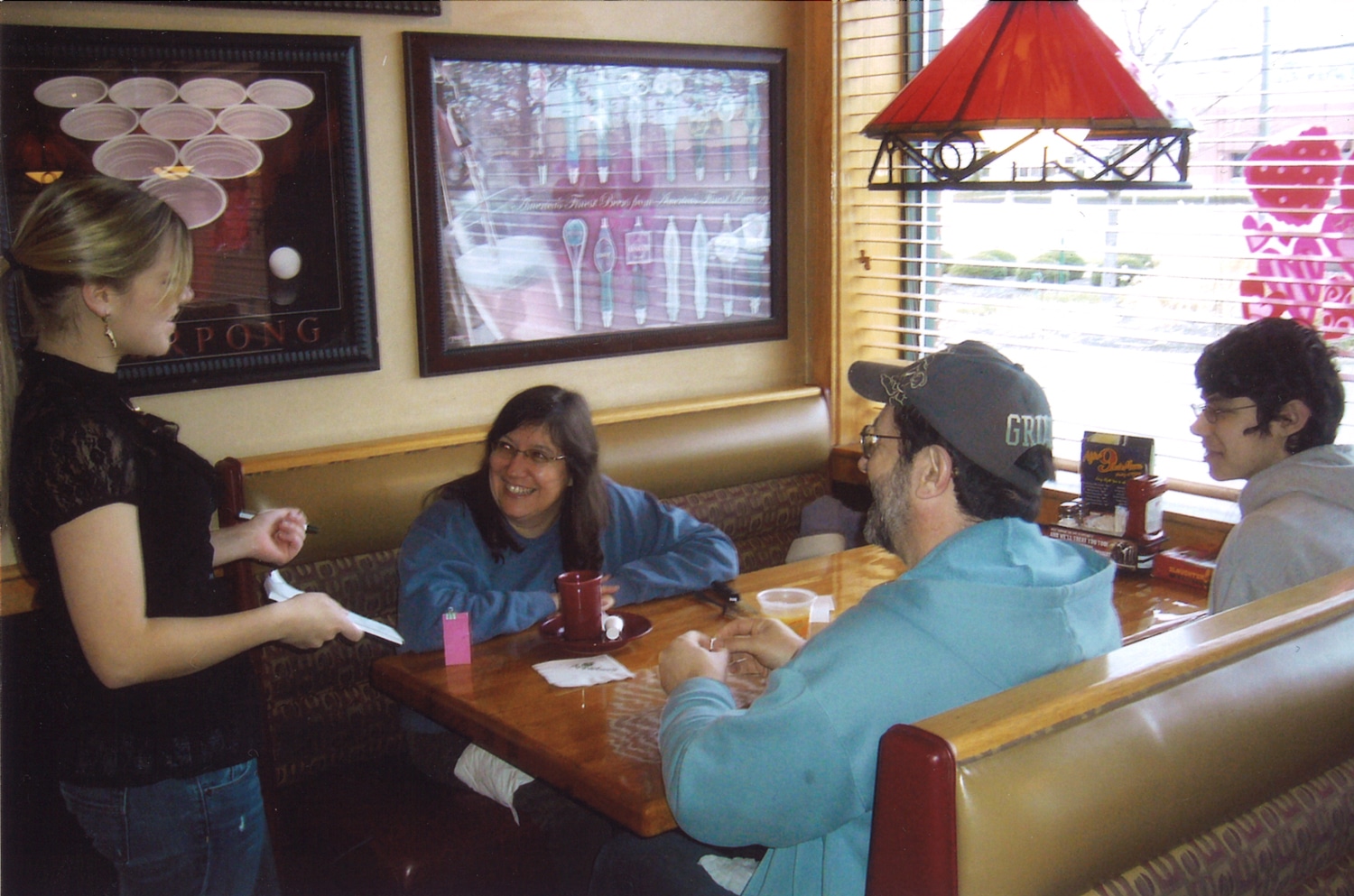Diane Steinberg and Felicia Jean Steele have served as Co-Advisors of The College of New Jersey‘s Sigma Tau Delta chapter for fifteen years, with Diane Co-Advising it with another faculty member before then. They became serious about fundraising in 2009, after the Wall Street crash, because state college budgets would no longer simply pay for student travel. Furthermore, in 2009 they suddenly began having 20+ students interested in attending and presenting at convention. It was a perfect storm of increased interest and decreased revenue. Since then, with the exception of one year, they have taken at least twenty and as many as thirty-two students to convention every year.
They typically fund raise about $500 per student attendee, counting $300 that the college simply gives them. They keep records of individual fundraising, allowing some students to travel at no cost at all to themselves, and others to cover only their registration fee. Their fundraising often covers airfare, the shared hotel room, and registration.
With the convention submission deadline fast approaching on Monday, November 1, 5:00 p.m. CDT, read on for advice from these seasoned fundraisers!
So your chapter wants to emerge from pandemic-induced seclusion and attend the Sigma Tau Delta 2022 International Convention—and now you need to find the funds to do so.
First, remember that the Sigma Tau Delta Central Office will fund your chapter at least $200 if at least one student member attends the business meeting and the regional caucus. This $200 may be the easiest fundraising of all. Your chapter can also consider applying for a Regents’ Common Reader Award—all chapters who hold a Common Reader event win a $100 award. This year’s Common Reader is Dear Martin by convention speaker Nic Stone.

Second, with the help of your Chapter Advisor, your department chair, or any friendly faculty member, explore on-campus resources for student travel. In the past, our chapter has been given money by our college’s Provost; our school’s Dean; the Deans in the Schools of Education, of Business, and of Arts and Communications; the Director of the Honors Program; and the Chair of the History Department. All these administrators have not given money each year, but if we have accepted papers in different subject areas, we simply ask. Many administrators have some “flexible spending” funds, and are willing to co-sponsor specific students or the entire group. Every donation helps. The most we have ever received from administrators was $9,000. We try to take about 24 students each year. Some campuses provide funds for student travel through an office of Student Life or Student Activities. Your Advisor can contact the Dean of Students at your school to ask about processes and procedures.
We have also had some luck soliciting donations from community service groups in our students’ home towns. Kiwanis, Lions and Elks clubs, and VFW and American Legion posts will sometimes make small donations if you write them a personal letter that describes the paper that will be read by the student from their town, especially a student who graduated from a local high school that you also name in the letter. You can also contact service groups associated with congregations, dioceses, and other faith communities.

Our last source of donations has been chapter alumni who have gone to the convention in past years. We have asked alumni for very specific reasons associated with high travel costs to some of the convention cities far from our chapter’s home. Our alumni giving was coordinated through our campus’s Alumni Affairs office, but a chapter could use a GoFundMe page. Donations to Sigma Tau Delta are tax deductible. Make sure to communicate with your campus’s alumni office to ensure you follow all the fundraising guidelines they establish. This might, however, be a great opportunity to make connections with your development office.
In addition to our donations, we have also raised funds through hard work. A local orchard pays school groups $90 per student volunteer per day to help with their fall apple picking and apple selling events. We have also signed up with Applebee’s Flapjack Fundraiser. Both of these are very successful because of the high rates of return. 100% from the orchard, and 75% from Applebee’s (which charges us $2 for each pancake eater and our pancake tickets are $8 for all you can eat pancakes, sausages, juice, coffee, and tea). Many other restaurant fundraisers earn only 10%-20% of the money members spend on food, and those returns are not a wise investment of student time. Some chapters have also organized tag sales or “leaf-raking corps,” where students donate their time to rake leaves of local residents. These efforts can also reaffirm your institution’s commitment to the local community.

Another nationally available fundraising group which has been very lucrative for us is Gertrude Hawk, which sells chocolate bars, and which returns 40%-50% depending on how many boxes of chocolates one orders. Most members have very little trouble selling the $1.50 chocolate bars. Gertrude Hawk will only ship chocolates once the weather cools. If no one on your campus is counting calories (or limits your ability to sell baked goods), you could also work with the Krispy Kreme fundraising program. They have even set up “contactless fundraising” to help chapters raise money during the pandemic.
Key to fundraising success is a student member who takes charge of it. This student member can be a fundraising chair, a chapter treasurer, or a separate student for each fundraiser.
 Diane Vanner Steinberg
Diane Vanner Steinberg
Felicia Jean Steele
Alpha Epsilon Alpha Chapter, Co-Advisors
The College of New Jersey, Ewing Township, NJ
Fundraising Resources
Convention Funding
Chapter Life Fundraising
Sweet Fundraising Ideas: Holiday Candy-Grams
A Superhero Fundraiser Idea
Submit to the 2022 Convention
To submit a paper to the Sigma Tau Delta 2022 International Convention in Atlanta, GA, visit the Submission Overview page to start the submissions process. All paper and roundtable submissions are due by Monday, November 1, 5:00 p.m. Central Daylight Time (CDT).
Convention Submission Resources
Submissions Overview
Paper Submissions
Roundtable Submissions
Submissions Evaluation Criteria
Hints for Successful Submissions


